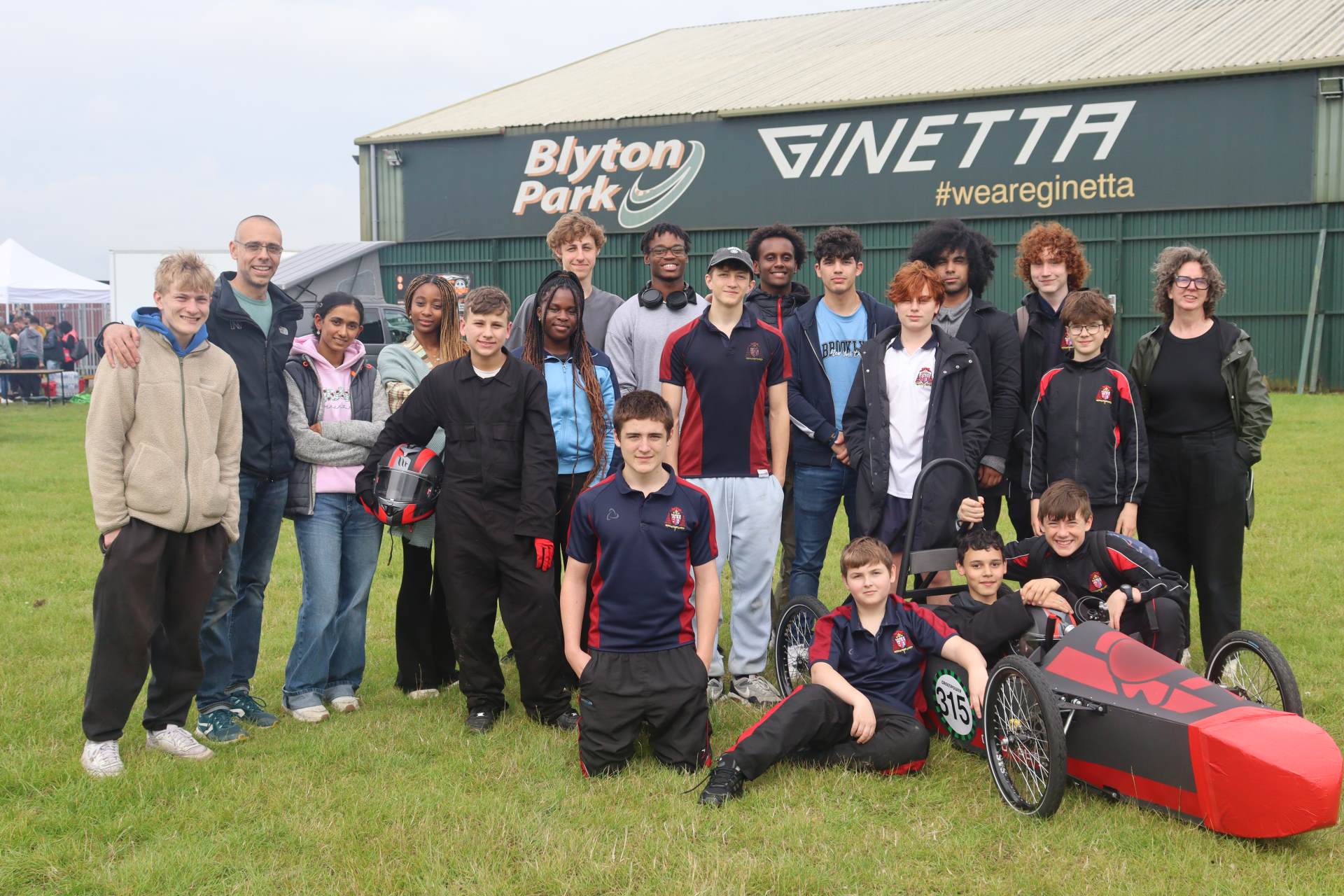Design Technology
Aims and Philosophy
Through the provision of a well-resourced and well-maintained facility with a friendly, happy and very safe working environment, it is the department's aim to provide a worthwhile technology experience where every boy can reach his full potential. Technology is a subject that has the capacity to provide a wide range of skills that are invaluable in our increasingly technological society, and through the depth and breadth of its work, it has an unrivalled capacity to bridge other curriculum subjects in addition to providing a real-life context in which most skills can be taught.
Regardless of whether our students intend to pursue technology as a subject beyond either Key Stage Three or GCSE level, it is hoped that the communication, manufacturing, lateral thinking and planning skills that they have developed will have a significant and positive impact on all subsequent work. Demonstrating the value of a designer's approach to solving real problems is a fundamental aim.
The Design and Technology Department in this School offers the subject to all students at Key Stage 3, which is optional at GCSE, whereby they can study GCSE Design and Technology and GCSE Engineering. All subjects then lead to a potential A-level in Product Design, which can combine all separate GCSE areas depending on which direction/career path the student wishes to take.
- First -Second Form - 1 hour per week (4% curriculum time)
- Third - Fifth Form – 2 hours per week (8% curriculum time)
- Sixth Form - 4.5 hours per week (20% curriculum time)
Curriculum Overview
Design & Technology
Engineering
Third Form Engineering Overview
Fourth Form Engineering Overview
Fifth Form Engineering Overview
GCSE Design & Technology
GCSE Design and Technology will prepare pupils to participate confidently and successfully in an increasingly technological world. Students will gain awareness and learn from wider influences on Design and Technology, including historical, social, cultural, environmental and economic factors. Students will get the opportunity to work creatively when designing and making, and apply technical and practical expertise.
Unit 1: Written Examination worth 50% of the GCSE (2-hour examination).
Unit 2: A design-and-make project worth 50% of the GCSE (30-35 hours).
Pupils are required to produce at least one final prototype based on a design brief they develop in response to a contextual challenge set by AQA.
The AQA Design & Technology specification is split into two units, allowing pupils to complete one major practical piece of coursework in Year 11 worth 50% of the full GCSE and an examination at the end of the course worth 50% of the full GCSE. Pupils will develop research and investigation skills, building upon designing and drawing skills and improving modelling and practical skills, primarily in the initial part of their GCSE course, which they will implement in the second and particularly the third year of the GCSE.
Although the final Design & Technology qualification no longer has the subject titles of, for example, Graphic Products, Resistant Materials, Electronic Products and Systems and Control, student preferences for any of these routes will be catered for and developed by the subject teachers.
The new qualification will allow both breadth and depth of knowledge, without limiting students to the materials they can work with. It will enable them to make choices appropriate to their design. It contains mathematical and scientific content that students must know and use that relates closely to Design and Technology. This includes, for example, number, geometry and measure, materials, energy, moments and forces, and electricity and electromagnetism.
The course aims to ensure that all students have the knowledge and skills to design and make products or prototypes, using the best material, equipment and techniques, to solve real-world and relevant problems across a range of contexts.
A link to the specification is below:
AQA | Design and Technology | GCSE | GCSE Design and TechnologyAQA GCSE Engineering
What do you need to know before taking this course?
You will have developed some related knowledge, skills and understanding during your Design and Technology lessons at Key Stage 3. These will be very useful during this course, but you do not need to have studied engineering before starting the GCSE. Engineering is about bringing ideas into reality by engaging in a range of engineering processes and through problem-solving and creative skills. So you must have a lively and enquiring mind, an interest in engineering, a willingness to explore new ideas and an ability to communicate your ideas effectively.
Key subject aims:
Our GCSE introduces students to a host of new technologies, helping them to gain practical skills and understanding to inspire a lifelong interest in engineering. It will particularly appeal to those who enjoy being creative, with an affinity for drawing, design, mathematics and problem-solving.
A GCSE in Engineering is a nationally recognised, work-related qualification designed to provide you with a choice of routes into further education, a variety of apprenticeships or employment. Engineering is one of the most important job sectors offering a wide variety of careers. A massive shortfall of Engineers will provide a huge number of future jobs in the UK and is seen as one of the few booming sectors in the economy.
The GCSE course in engineering requires students to develop subject knowledge, skills and understanding that allow them to solve engineering problems in an informed way. The course will give students access to the use of new technologies, materials and processes in addition to established engineering practices. It will enable students to put theory into practice, solving engineering problems through the application of mathematical principles and computer modelling/simulation to produce carefully considered manufactured outcomes which showcase essential practical skills.
Students must apply their knowledge in a variety of contexts, developing systems that contribute to effective functional products that they build and test. Students must understand the contribution that engineering makes to society and the economy, and have the opportunity to make informed decisions about further learning opportunities and career choices.
The AQA GCSE in Engineering consists of 2 units
Unit 1: Written Examination worth 60% of the GCSE. (2-hour written examination)
Unit 2: A design-and-make project worth 40% of the GCSE. (Non-exam Assessment)
The GCSE in Engineering will involve contact with engineering firms and will provide an excellent grounding for the A-Level, or for pupils who wish to enter an Apprenticeship after GCSE.
View the learning journey for this course here.
A link to the specification is below:
AQA | Engineering | GCSE | GCSE Engineering
A-Level Design Technology: Product Design
The course we offer is the AQA Board's Design and Technology: Product Design A level 7552. This qualification is linear, meaning that students will sit all their exams and submit all their non-exam assessments at the end of the course.
The AQA A-Level in Product Design consists of 3 units:
Paper 1: Written exam: 2.5 hours - 120 marks - 30% of A-level
Paper 2: Written exam: 1.5 hours - 80 marks - 20% of A-level
Non Examined Assessment (NEA): Substantial design and make project - 100 marks - 50% of A-level
This creative and thought-provoking qualification gives you the practical skills, theoretical knowledge and confidence to succeed in several careers. Especially those in the creative industries. You will investigate historical, social, cultural, environmental and economic influences on design and technology, whilst enjoying opportunities to put your learning into practice by producing prototypes of your choice. You will gain a real understanding of what it means to be a designer, alongside the knowledge and skills sought by higher education and employers.
A-level Design and Technology: Product Design requires students to engage in both practical and theoretical study. This specification requires students to cover design and technology skills and knowledge as set out below. These have been separated into:
Technical principles
Designing and Making principles
Students should develop the ability to draw on and apply a range of skills and knowledge from other subject areas to inform their decisions in design and the application or development of technology. There are clear links between aspects of the specification content and other subject areas such as Computer Science (section ‘The use of computer systems’ and section ‘Digital design and manufacture’); Business Studies (section ‘Enterprise and marketing in the development of products; Art and Design (section ‘Design communication’) and History (section ‘Design Theory’). This is not an exhaustive list, and there are other opportunities within the specification for students to integrate and apply their wider learning and understanding from other subject areas studied during Key Stage 4, as well as those subjects that they are studying alongside A-level Design and Technology. Students must also demonstrate mathematics and science skills.
This course will enable you to develop your knowledge and understanding of materials, manufacturing, electronics, CAD/CAM and graphics. It will be a suitable qualification should you wish to study Architecture, Engineering, Design or Graphics at University. During the course, you will be expected to produce a range of designs, products and solutions to a range of problems, some given by your teachers and some decided upon by yourselves.
View the learning journey for this course here.
A link to the specification is below:
AQA | Design and Technology | A-Level | A-level Design and Technology
Extra-Curricular Opportunities




